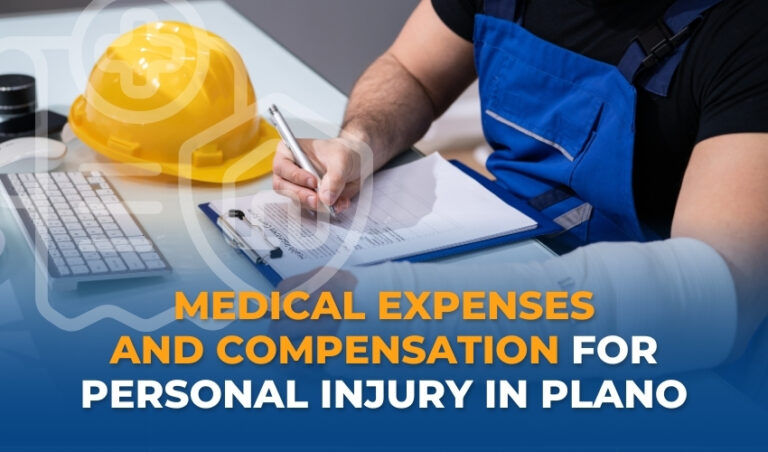Personal injuries can significantly impact lives, often resulting in physical, emotional, and financial challenges. In Plano, Texas, understanding the complexities of medical expenses and compensation in personal injury cases is beneficial for those seeking fair reimbursement. This article aims to provide insight into medical expenses and compensation in personal injury cases to help you navigate this challenging situation.
Types of Medical Expenses in Personal Injury Cases
Personal injury cases involve a wide range of medical expenses. These often begin with emergency medical care, which is frequently the first and most critical intervention following an accident. The urgent nature of emergency room visits and ambulance services typically marks the start of what can be an extensive medical journey.
Following initial emergency care, many injury victims face extended hospital stays and potentially complex surgeries. These can vary from minor procedures to major operations, each contributing to the overall medical costs. Diagnostic tests and imaging, such as X-rays, MRIs, and CT scans, play a vital role in identifying and treating injuries while also adding to the total expenses.
As treatment progresses, the costs of medications and medical equipment become a consideration. From pain management drugs to specialized mobility aids, these expenses can accumulate quickly. For many, recovery extends beyond hospital care. Rehabilitation and therapy, including physical therapy, occupational therapy, and sometimes psychological counseling, form an essential part of the healing process.
In cases of severe injuries, long-term care and assistance may be necessary and could involve home modifications, ongoing nursing care, or help with daily living activities. These long-term needs often represent a substantial portion of medical expenses in serious injury cases.
Calculating Medical Expenses
Accurately calculating medical expenses is a critical step in pursuing fair compensation. Current medical bills provide a starting point, but they often only tell part of the story. We have to consider not just the costs already incurred but also estimated future medical costs.
In many instances, testimony from healthcare professionals is integral for projecting long-term medical needs. Medical professionals, life care planners, and economic analysts can provide valuable insights into the likely course of treatment and associated costs over a victim’s lifetime. This comprehensive approach to calculating medical expenses helps address all aspects of care.
Compensation for Medical Expenses
Compensation for medical expenses in personal injury cases typically falls into three categories: economic damages, non-economic damages, and in some cases, punitive damages.
- Economic damages are the most straightforward, covering direct medical costs such as hospital bills, medication expenses, and therapy costs. These tangible expenses form the foundation of most personal injury claims.
- Non-economic damages, while less tangible, are equally important. They encompass the pain and suffering endured as a result of the injury. While it’s challenging to quantify these experiences, they are an essential component of comprehensive compensation. The physical discomfort, emotional distress, and overall impact on quality of life are all considered when determining non-economic damages.
- In cases of extreme negligence or intentional harm, punitive damages may be awarded. While less common, these damages serve to penalize the wrongdoer and discourage similar behavior in the future. It’s important to note that punitive damages are not directly tied to medical expenses but can significantly increase the overall compensation in a case.

Factors Affecting Compensation for Medical Expenses
Several factors influence the amount of compensation awarded for medical expenses in personal injury cases. For starters, more severe injuries typically result in higher medical costs and greater impact on the victim’s life which can lead to larger compensation amounts.
Long-term or permanent injuries that require ongoing care will generally result in higher compensation than injuries with a shorter recovery period. The impact on quality of life is also carefully considered. Injuries that significantly alter a person’s ability to work, enjoy hobbies, or maintain relationships often lead to higher compensation awards.
Pre-existing conditions can complicate the calculation of medical expenses. While they don’t preclude compensation, they may affect how expenses are attributed to the injury in question. It helps to work with attorneys who understand these complexities and can advocate for fair compensation.
Insurance and Medical Expenses
Health insurance may be used to cover your medical expenses, but it’s important to understand the concept of subrogation. This means that if your health insurance company pays for medical treatment related to your injury, they may have a right to be reimbursed from your settlement or award.
In car accident cases, insurance considerations become even more complex. Texas is an “at-fault” state, meaning the driver who caused the accident is typically responsible for the resulting damages he is responsible for. This is usually covered by the at-fault driver’s auto insurance policy. However, if the at-fault driver is uninsured or underinsured, you may need to rely on your own insurance coverage. Additionally, your own policy’s Personal Injury Protection (PIP) or Medical Payments coverage can help cover immediate medical expenses regardless of fault.
For workplace injuries, workers’ compensation insurance typically covers medical expenses and a portion of lost wages. However, in cases where a third party is responsible for the injury, additional compensation may be pursued through a personal injury claim.
Documenting Medical Expenses
Proper documentation of medical expenses is paramount in personal injury cases, and this goes beyond simply keeping bills and receipts. Maintain a comprehensive record of all medical treatments, including dates of visits, names of healthcare providers, prescribed medications, and any medical equipment or supplies purchased.
Working closely with healthcare providers to obtain accurate and detailed medical records is important because these records not only substantiate your expenses but also provide essential evidence of the nature and extent of your injuries. In some cases, it may be necessary to obtain medical opinions to fully illustrate the impact of the injury on your life and future medical needs.

Legal Options for Recovering Medical Expenses
While many personal injury cases are resolved through settlement negotiations, it’s important to understand all available legal options. Mediation and arbitration can be effective alternatives to traditional courtroom litigation as they often result in faster resolutions and lower costs. In cases where fair compensation cannot be reached through negotiation or alternative dispute resolution methods, filing a lawsuit may be necessary. This step escalates the case to the formal legal system, where a judge or jury will ultimately decide the outcome.
As trusted personal injury attorneys in Plano, we understand the nuances of each of these options. Our goal is to work towards the best possible outcome for our clients, whether that’s through negotiation or courtroom advocacy. We believe that injured individuals deserve fair consideration for their medical expenses and the impact on their lives, and we’re committed to advocating for that justice. If you have questions about your personal injury case in Plano, consider scheduling a free consultation with a local personal injury law firm to discuss your situation and potential options.






